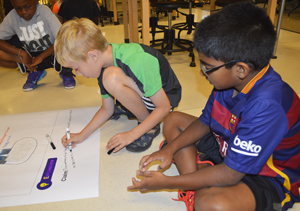Six students sat hunched on the floor, writing on a poster bearing photos of penguins they’d taken the previous day at John Ball Zoo. Their task: identify the living and non-living things in their habitat those penguins need to survive.
“They need plants,” offered one boy. “Don’t they need plants?”
“Soil!” piped up another. “Soil they don’t need,” corrected the first boy, saying that’s only needed by “things that live underground.”
The fourth- and fifth-graders compiled a list of survival needs – air, water, food, shelter etc. — then stood before their whole class of two dozen students to present and defend their findings.
This is the scientific method. And it’s what students are learning this summer at the Van Andel Education Institute, a block away from real scientists seeking cures for cancer and other diseases.
At this three-week class, students’ investigative aims may be humbler than those of biomedical researchers at the nearby Van Andel Institute. But the methods they learn could help them apply critical-thinking and problem-solving skills at school in beyond – and possibly launch science or engineering careers, organizers say.
“It’s really about engaging them in thinking and acting like a scientist, so they understand what science is about,” said Jim Nicolette, associate director of the Van Andel Education Institute. “We’re trying to transform science education so kids are actually doing science, not just learning about science.”
Partnering with Schools

The summer classes, part of the Out-of-School Time Cohort Program, are among the initiatives in which the VAEI aids and promotes science education in Kent ISD schools and far beyond. Its Science Academy serves some 750-800 students a year from West Michigan schools, seeking to bolster their understanding of and interest in science for a society they say is badly in need of well-educated professionals and thinkers.
“Scientists are the ultimate problem-solvers,” said Nicolette, a former science teacher and principal. “It’s vitally important for us as a society to make sure our kids are coming out with these skills.”
Programs include half-day field experiences interacting with scientists at the Institute atop Michigan Street hill; “Science on Saturday” sessions where students and adults team up on scientific investigations like extracting DNA (including their own); and a High School Journal Club, which brings advanced high school students and teachers together with Van Andel Research Institute scientists to visit labs and discuss scientific articles.
Added to the offerings this past school year is NexGen Inquiry, an online platform that helps students perform self-directed science investigations with the use of interactive journals. Several sponsors supported the program in Kent County districts including Grand Rapids, East Grand Rapids and Forest Hills public schools. Since its launch in August 2015, NexGen has been used by some 10,000 students and 2,500 teachers in all 50 states and nine countries.
Along with providing professional development for teachers, the Science Academy aims to move learning away from listening to doing, and from teacher-led to student-directed inquiry. Using a model called Community of Scientific Practice, it pushes students to pose questions, conduct investigations, analyze data and defend their findings – in other words, work like scientists.
For instance, kindergartners may learn about Newton’s second law of motion – acceleration is produced by force acting on a mass – by moving balls around on a floor.
“It’s really encouraging students to do science, not just learn it for a test and forget about it the next day,” said Robin Dhaseleer, VAEI’s marketing and community manager.
Science is Happening at the Zoo
That’s the idea at the summer program, where nearly 50 students gathered in two sessions this July and August. Now in its 10th year, the Out-of-School Time Cohort Program serves fourth- and fifth-graders both during summer and after school. Students stay involved for three years at no cost, with tuition underwritten by Van Andel Institute.
The student-scientists tackle a challenging topic: How does human health depend on biodiversity, in species, the ecosystem and genetics?
The question leads them to some fun experiments, like which kind of mouthwash kills the most bacteria. Another measures the heartbeats of water fleas when dripped with monster energy drinks or Nyquil.
It’s not enough to just experiment, though. Students measure the results, record them in graphs then present their findings. At the end of their three weeks, they make presentations to large groups including parents, VAI scientists and donors.
In an August class of first-year students, they warmed up for the final presentation by giving one to classmates on their excursion to John Ball Zoo. Displaying poster boards, students told what they observed in the habitats for tigers, penguins, chimpanzees and bears, and which living and non-living elements were needed for their survival.
“You’re going to be the science experts for the different animals you studied,” said Lisa Neeb, who co-taught the class along with Kara Dixon.
“The question we were trying to answer was, what does an organism need to survive in its environment?” said a girl introducing her “tiger team” presentation. Another student detailed the elements needed for survival: “water, shady and sunny areas, food and plants.”
Students also fielded questions from their peers, as when a boy asked the tiger team how the zoo animals’ “attitude” might be different from those in the wild.
“In the wild they would have to go hunt for their prey, but they just get fed at the zoo,” one girl gamely answered.
It was the kind of thinking-on-her-feet skills VAEI leaders aim to cultivate.
“They’re not all going to be scientists,” Dhaseleer said, “but it’s going to make them better thinkers and problem-solvers.”
CONNECT
Van Andel Education Institute Science Academy
Van Andel Institute Experience Moves Students to Become Scientists









